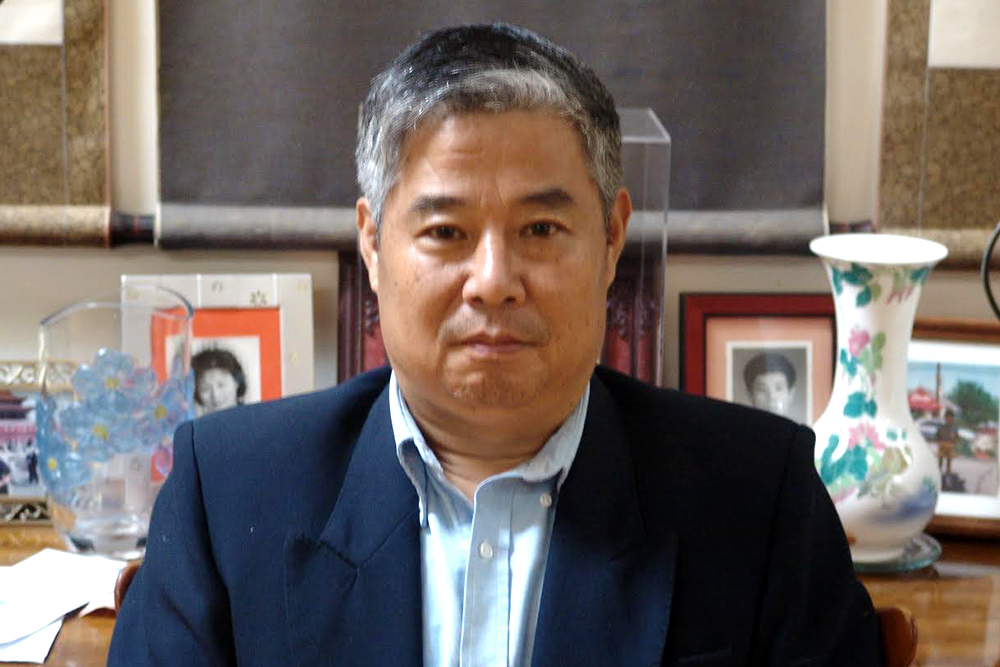Was the Cultural Revolution in Mao’s China really such a disaster? Dr. Dongping Han, professor at Warren-Wilson College and a native of rural China, offers the 2017 Albert N. Keim Lecture on Tuesday, March 28, at Eastern Mennonite University (EMU).
The lecture, titled “The Cultural Revolution: A Reinterpretation from Today’s China,” will be at 5 p.m. in the Strite Conference Room (#105) of EMU’s Campus Center. It is sponsored by the Albert N. Keim Lecture Series and the EMU History Department.
Following the lecture, Evan Davis, a sophomore history major from Falls Church, Virginia, and Wu Jing, a junior psychology major from Beijing, China, will provide brief responses.
“Understanding the story of modern China and especially how the Chinese themselves view their own history is essential for those who want to be informed about global politics and economics,” says Professor Mary Sprunger, chair of the EMU History Department. She leads a cross-cultural semester to China in fall 2018.
Cross cultural co-leader Dr. Myrrl Byler, who teaches the history of Asia at EMU and is executive director of Mennonite Partners in China, points out that Han’s lecture provides an important and distinctive perspective on the Cultural Revolution.
“There are good reasons why catastrophic events in history are presented from only one side,” he says. “However, the overwhelming negative consequences of such events can hide narratives that give context and a larger perspective. China’s size, diversity and complexity make it an easy target for generalizations and misunderstanding. The strategic importance of China in today’s world makes it imperative that we listen discerningly to voices that present the complexity of significant events.”
Han grew up in rural Shangdong province. After studying English literature, translation and education in China and Singapore, he completed a master’s degree in history at the University of Vermont and a PhD in politics at Brandeis University. In addition to teaching at Warren-Wilson, where he’s been since 2000, he holds special teaching appointments at Wenzhou University and Hebei University.
Han has published a range of scholarly works, including “The Unknown Cultural Revolution: Life and Change in a Chinese Village” (2008). He commentates on economics and politics for such news and analysis sites as China Daily and China-U.S. Focus. He has received many fellowships and research awards as well.
EMU has strong connections with China. Each year, the campus hosts 10-12 visiting scholars from approximately eight different universities for a sabbatical semester to learn about American culture and pedagogy. Additionally, an agreement between the Sichuan University of Arts and EMU was formalized for cultural exchange in January 2015.
A cross-cultural group from EMU, co-led by Byler, was last in China in the fall of 2015 (visit their cross-cultural blog).
More about the Albert N. Keim Lecture Series
Professor Albert “Al” N. Keim died in 2008 at the age of 72 of complications following a liver transplant. He served as a professor at EMU for 35 years and was the academic dean from 1977 to 1984. The lecture series honors his memory.
Learn more about past presenters, in this sampling:
2016: Artist/activist Mark Strandquist provided a lecture titled “Performing Statistics: Connecting incarcerated youth, artists, and leading policy experts to challenge Virginia’s juvenile justice system.”
2015: Charles R. Epp, political scientist in the University of Kansas’s School of Public Affairs and Administration, presented “The Police and Racial Discrimination in America.”
2014: Vincent Harding, a pastor, activist and history professor who helped EMC professors initiate social change in Harrisonburg during the early 1960s, presented “Is America Possible?”
